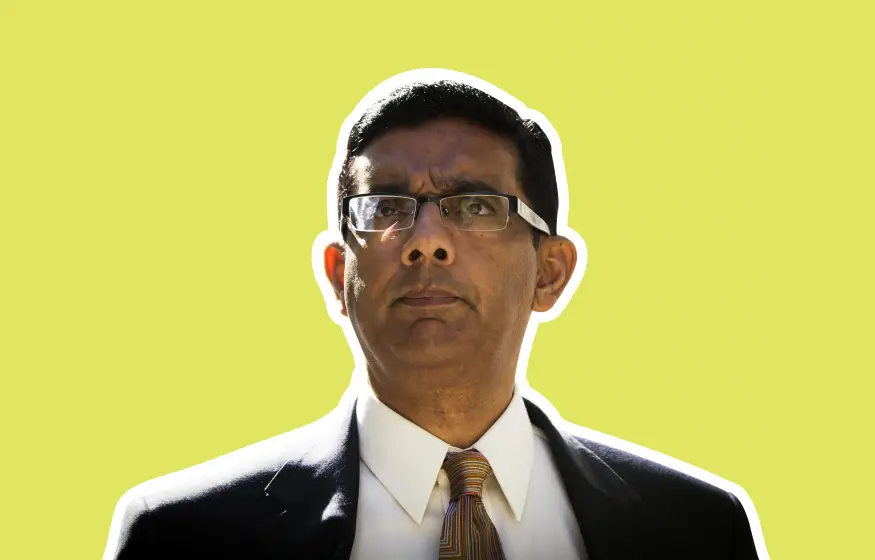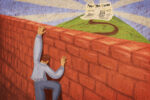In the wake of the Parkland shooting, crown prince of “hot takes” Dinesh D’Souza decided to flex some of his bad opinions on Twitter.
In a characteristic stroke of brilliance, D’Souza decided it would be a good idea to respond to images of survivors watching in distress as the Florida House voted down a measure to ban assault weapons with the tweet, “Worst news since their parents told them to get summer jobs.”
Worst news since their parents told them to get summer jobs https://t.co/Vg3mXYvb4c
— Dinesh D'Souza (@DineshDSouza) February 20, 2018
This was apparently not enough of a statement for D’Souza, because soon after he tweeted, “Adults: 1, Kids: 0.”
Adults 1, kids 0 https://t.co/24iqKtnTxy
— Dinesh D'Souza (@DineshDSouza) February 20, 2018
D’Souza’s take here is that teenagers are inherently lazy and not worth listening to, even when they have survived a horrific, traumatic event and are making every effort to prevent such an event from happening again. It’s not just a bad opinion — it’s a meticulously tailored bad opinion, specially manufactured to get a rise out of anyone who reads it.
One would hope this kind of disgusting and transparent plea for attention via trolling would be beneath the dignity of a grown man, but clearly, that would be too much to expect in the current media landscape. Conventional wisdom seems to show that nuance in the media doesn’t get clicks, but bad opinions, especially if they’re confidently stated and edgy, sure do.
But the issue is far bigger than just D’Souza: These kinds of attempts to manufacture outrage are indicative of how media is produced and consumed today.
Our feeds are flooded with people vying for our attention, trying to one-up each other’s hot takes in more and more outrageous ways — which has made it a lot harder to engage in actual conversations beyond surface-level outrage.
Hold up, what exactly is a hot take?
According to Simon Maloy of Salon, a hot take is “a piece of deliberately provocative commentary that is based almost entirely on shallow moralizing.” A hot take is essentially clickbait masquerading as a thoughtful, novel opinion, often made in the heat of the moment so as to capitalize on the response as quickly as possible.
Hot takes will often take something the public understands as a “given” and flip it on its head, in a kind of disorienting mental gymnastics designed to upset anyone unfortunate enough to encounter them. Purveyors of the hot take will often claim they’re “telling it like it is” (sound familiar?).
In the case of D’Souza, the societal “given” was showing respect to school shooting survivors. Later, he apologized for his comments, but also somewhat defended his actions.
In his apology, D’Souza claimed he said what he said because he truly believed the media was manipulating these students — which any reasonable person would argue is hardly an excuse for attacking the survivors’ moral characters or taking active delight in their loss.
In fairness to D’Souza, his attention-hogging strategy worked: he did end up trending on Twitter. It also got him a couple slaps on the wrist: he was uninvited from a speaking event and condemned by many of his fellow conservatives.
Knowing D’Souza, though, in a couple months he’ll be right back to airing his nonsense on whatever platform he can get his hands on and the cycle of outrage will continue.
Why are hot takes a problem?
The predominance of the hot take has been actively harmful to any semblance of thought or nuance in the media. The problem is not just on social media: news and opinion media outlets have also been capitalizing on the hot take.
Prominent examples include Camila Long’s take in the Sunday Times that “Moonlight” was too unrelatable to its supposed target audience of straight, white, middle-class people (what?), or Leandra Medine’s take for Man Eater that Beyonce’s pregnancy photos were unnecessarily flaunting and potentially hurtful to women who are not pregnant (which Medine has since apologized for).
The problem is that these are not just lazy opinion pieces — they’re lazy opinion pieces that are provocative and get clicks, and their popularity has changed the media landscape, making it much harder for nuanced perspectives to survive in the media.
Writing for Quartz, John West outlined the danger of hot-take-based media when he said, “Publishers can produce a hot take on the outrage du jour…Plus, if the take is hot enough, which is to say counterintuitive enough, shallow enough, moralizing enough, it can yield far greater dividends than your average listicle.”
Opinion-based media has come to understand that outrage gets clicks, so they seek out these provocative pieces.
West adds, “Pretty soon, publishers are churning outtakes on others’ takes. Does Fusion have a take on Salon’s thinkpiece about the Slatepitch from The New Republic? Probably. Online, there can never be one take to rule them all.”
It never ends with the original hot take: everyone has to offer their opinion on it so that they too can capitalize on all the attention that is suddenly being directed towards it.
This back and forth then takes over everyone’s news feeds and everyone is forced to engage with whatever bad opinion started the whole mess, including all the subsequent opinions that sprouted from it.
Everything circles back to the problem of attention. Media outlets assume the audience is shallow and only willing to click on the most provocative take, so important issues get put on the backburner and everyone is invited to participate in the outrage and the public shaming of attention-seeking creators posting what ultimately only amounts to glorified clickbait.
Instead of reminding us about news of vital import, like what’s happening in Flint or the Rohingya crisis, everyone’s news feeds are cluttered with the latest nonsense spouted by Dinesh D’Souza and his ilk. Therein lies the greatest problem with hot takes: When everyone’s talking just for the sake of getting a rise out of people, there is no real conversation.

















